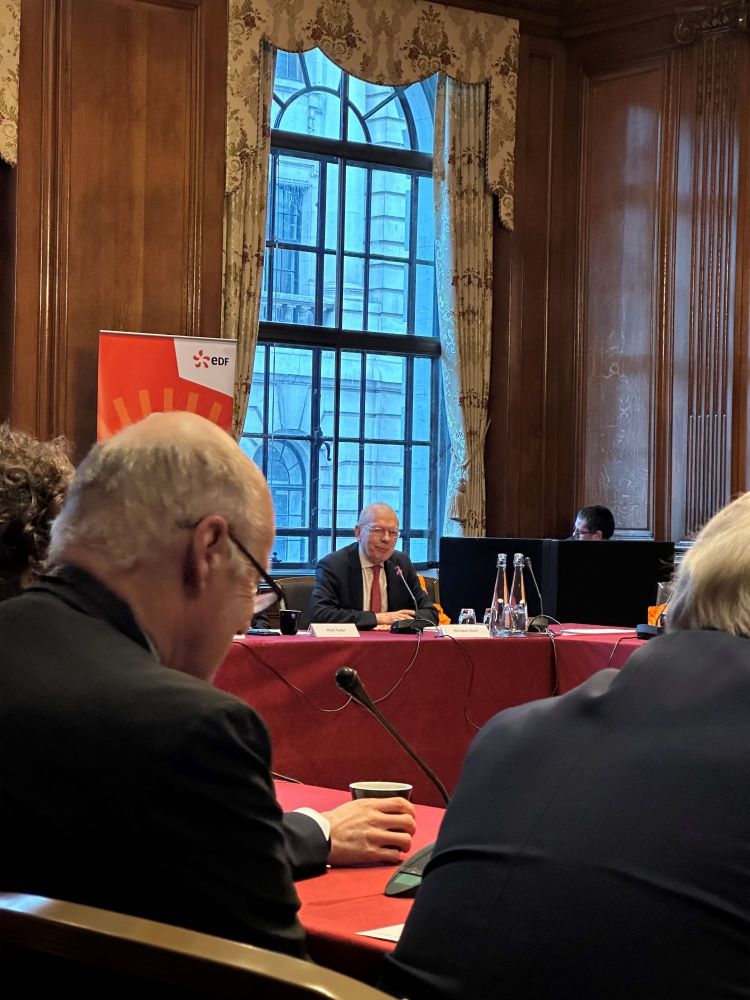The UK’s nuclear moment – building for the future with confidence
From jobs and skills to delivering clean power, nuclear energy in the UK is bringing multiple benefits to communities. But 2025 will be a critical year to secure the sector’s long-term future
With more than 85,000 jobs at nuclear sites and across the supply chain, a contribution of £123 billion to the economy since 1976 and a key role in the drive to net zero, the UK’s nuclear industry is “in a really good position for going forward”.
That was the verdict of panellists at a roundtable event hosted by EDF as part of Nuclear Week in Parliament, a programme organised by the Nuclear Industry Association (NIA) to showcase what the sector has to offer.
However, the panel agreed that time is of the essence as the industry awaits final decisions on Sizewell C and the Small Modular Reactor (SMR) competition, and that more needs to be done to demystify the sector and get the public on board.
Lord Hunt, Minister for Energy Security and Net Zero, opened the event by paying tribute to EDF, the UK’s largest producer of low-carbon electricity, for its work. The UK currently has five operational nuclear power plants, all owned by EDF. Three advanced gas-cooled reactors (AGRs) have ceased generation and are in the defueling phase, the first stage of decommissioning.
“I want to start by saying a big thank you on behalf of the Government to EDF – not just for what they’re doing in relation to Hinkley Point C and Sizewell C but for their running of our current nuclear plants,” said Lord Hunt.
 “Since EDF came in, their investment, their work with the supply chain and their work with further education have contributed to a situation on which we can now build for the future with a great deal of confidence.”
“Since EDF came in, their investment, their work with the supply chain and their work with further education have contributed to a situation on which we can now build for the future with a great deal of confidence.”
But like other speakers, he said that “collectively as an industry we need to be much more outgoing in the future about promoting the value of our industry, attracting people in and growing confidence in what we’re doing and at the same time helping to decarbonise society and growing the economy."
Lizzi Collinge, MP for Morecambe and Lunesdale, was full of praise for the benefits that the two Heysham nuclear power stations have brought to her constituency – from jobs and skills to being part of the drive to combat climate change.
“It brings good, unionised jobs,” she said. “It has made us part of clean energy provision. The City Council very much appreciates the business rates that are generated and in a wider sense the power stations have been a really fundamental part of our community and have given so much back to our community.
“The benefits of nuclear and its embeddedness in our community are really clear but it's not just those direct benefits, it's the indirect benefits too. Morecambe and Lunesdale is a coastal community. We are at high risk from climate change and the contribution nuclear can make to combating climate change will be absolutely vital for communities like mine.”
Sue Ferns, Senior Deputy General Secretary of Prospect, whose 157,000 members work as scientists, engineers, tech experts and other specialists, said that the nuclear industry is one of the few that provides “good, well-paid jobs” outside London and the South East. But she added that as well as apprenticeships and graduate programmes, she would like to see a more diverse workforce and more mid-career changers joining the industry.
Responding to this, Lynne Matthews, head of Destination Nuclear, which works to recruit more people into the nuclear sector to help fill critical skills gaps, said that recent research showed an 52% increase in the number of people who would now consider a career in the nuclear industry when they wouldn’t have before.
Meanwhile Matt Tudor, Vice Principal for Strategy and Partnerships at Bridgwater & Taunton College, just 12 miles from Hinkley Point, spoke of the role of education in helping to equip the nuclear industry with the skills it needs. From apprenticeships in steel fixing and welding through to qualifications in compliance, onboarding and safety, he said that the college’s involvement with Hinkley Point had helped to raise aspirations and had provided the biggest opportunities the region had seen, including the construction of roads, hotels and schools.
 Looking to the future, Simone Rossi, UK CEO of EDF, told guests that he and his fellow industry professionals have a responsibility to keep the industry strong. He recalled the long gap in building new nuclear power stations in the UK after Sizewell B and warned against the dangers of making the same mistake again.
Looking to the future, Simone Rossi, UK CEO of EDF, told guests that he and his fellow industry professionals have a responsibility to keep the industry strong. He recalled the long gap in building new nuclear power stations in the UK after Sizewell B and warned against the dangers of making the same mistake again.
“Thirty years ago, here in Britain, we made a huge mistake, a huge mistake that we still regret to this day,” he said. “We had a plan to deploy four identical power stations that was stopped after the first one, Sizewell B, was built.
“What a wasted opportunity, what a tragic loss of skills. The supply chain disappeared and it took literally a generation to get everything started again – and how hard it was to start. Repetition is the key to drive down the cost, to make it more efficient, to build it faster so 2025 is the year when we have the opportunity not to make the same mistake again.”
Sue Ferns agreed wholeheartedly. “We’ve got an opportunity now to transform the economy, to transform people's lives, to transform people's communities,” she said. “If we don't take it now, we won't have it in 14 years’ time. It's got to be now.”
